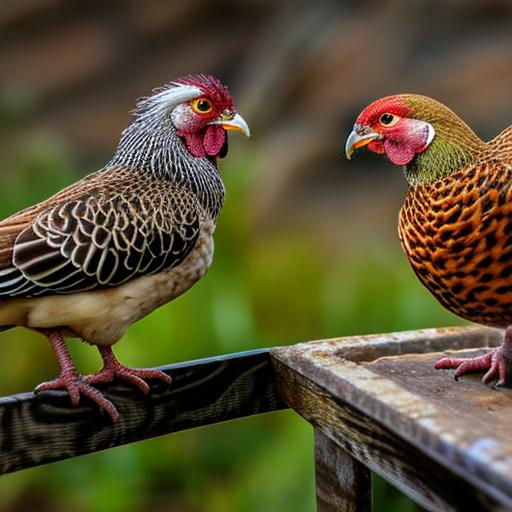Keeping chickens in a residential area in South Africa has become increasingly popular in recent years. Many people are realizing the benefits of having their own flock of chickens, from fresh eggs to natural pest control. However, before embarking on this venture, it is important to understand the legalities of keeping chickens in a residential area in South Africa. By following the regulations and guidelines set forth by local authorities, you can avoid any potential legal issues and enjoy the many benefits that come with backyard chicken keeping.
Key Takeaways
- Keeping chickens in a residential area in South Africa is legal, but there are regulations to follow.
- Keeping chickens in your backyard can provide fresh eggs, fertilizer, and pest control.
- Choose chicken breeds that are suitable for your climate and space limitations.
- When building a coop, consider factors such as ventilation, predator protection, and ease of cleaning.
- Proper feeding and care can keep your chickens healthy and happy, reducing noise and odor issues.
- Be considerate of your neighbors by managing noise and odor and protecting your chickens from predators.
- Keeping chickens can be a cost-effective investment, but it requires time and effort.
- Selling eggs from home requires compliance with food safety regulations.
- Joining a community of chicken keepers can provide resources and support for successful chicken keeping.
Understanding the Legalities of Keeping Chickens in a Residential Area in South Africa
When it comes to keeping chickens in a residential area in South Africa, there are certain legal requirements that must be followed. These regulations are put in place to ensure the safety and well-being of both the chickens and the surrounding community. It is important to familiarize yourself with these requirements before starting your own flock.
One of the main regulations is the number of chickens allowed per property. In most residential areas, there is a limit on the number of chickens that can be kept. This limit varies depending on the size of the property and the specific regulations set by local authorities. It is important to check with your local municipality or homeowners association to determine the maximum number of chickens allowed.
Another important aspect to consider is the distance between your chicken coop and neighboring properties. This is to prevent any potential issues with noise or odor that may arise from keeping chickens. The specific distance required may vary depending on your location, so it is important to check with local authorities for guidance.
The Benefits of Keeping Chickens in Your Backyard in South Africa
There are numerous benefits to keeping chickens in your backyard in South Africa. One of the most obvious benefits is having a constant supply of fresh eggs. Not only are these eggs delicious and nutritious, but they also provide a sense of self-sufficiency and reduce reliance on store-bought eggs.
In addition to fresh eggs, chickens also provide natural pest control. They eat insects and other pests that may be present in your garden, reducing the need for chemical pesticides. This is not only beneficial for your garden but also for the environment.
Furthermore, keeping chickens can have positive environmental and health benefits. Chickens produce manure, which can be used as a natural fertilizer for your garden. This reduces the need for synthetic fertilizers and helps to improve soil health. Additionally, spending time with chickens has been shown to reduce stress and promote mental well-being.
Choosing the Right Breeds of Chickens for Your Residential Area in South Africa
When it comes to choosing the right breeds of chickens for your residential area in South Africa, there are several factors to consider. One of the most important factors is the climate in your area. South Africa has a diverse climate, ranging from hot and dry to cool and wet. It is important to choose breeds that are well-suited to the climate in your specific location.
Another factor to consider is the size of your property. If you have a small backyard, you may want to choose smaller breeds that require less space. On the other hand, if you have a larger property, you may have more options when it comes to choosing breeds.
There are also different breeds of chickens that are known for their egg-laying abilities, meat production, or ornamental qualities. It is important to consider your specific goals and preferences when choosing breeds.
Building a Coop: Essential Considerations for Keeping Chickens in a Residential Area in South Africa
Building a coop is an essential part of keeping chickens in a residential area in South Africa. The coop provides shelter and security for your chickens, as well as a place for them to lay their eggs. When building a coop, there are several considerations to keep in mind.
One of the most important considerations is ventilation. Chickens produce a lot of moisture, so it is important to have proper ventilation in the coop to prevent the buildup of humidity. This can be achieved through windows, vents, or other openings that allow for airflow.
Security is another important consideration. The coop should be predator-proof to protect your chickens from potential threats. This can be achieved by using sturdy materials, such as wire mesh, and ensuring that there are no gaps or openings that predators can access.
Additionally, the coop should provide enough space for your chickens to move around comfortably. The general rule of thumb is to allow at least 4 square feet of space per chicken in the coop. It is also important to provide a separate area for nesting boxes and roosting perches.
Feeding and Caring for Your Chickens: Tips for Keeping Them Healthy in a Residential Area in South Africa

Feeding and caring for your chickens is essential to keeping them healthy in a residential area in South Africa. Chickens require a balanced diet that includes a combination of grains, protein, fruits, and vegetables. It is important to provide them with a commercial chicken feed that is specifically formulated for their nutritional needs.
In addition to commercial feed, chickens also enjoy foraging for insects and other small creatures. Allowing them access to a fenced area where they can forage can help supplement their diet and provide mental stimulation.
It is also important to provide fresh water at all times. Chickens require clean water for hydration and digestion. Make sure to clean and refill their water containers regularly to prevent the buildup of bacteria.
Regular health checks are also important to ensure the well-being of your chickens. Look out for any signs of illness or injury, such as lethargy, loss of appetite, or abnormal behavior. If you notice any issues, it is best to consult with a veterinarian who specializes in poultry health.
Managing Noise and Odor: How to Keep Your Neighbors Happy When Keeping Chickens in a Residential Area in South Africa
Managing noise and odor is crucial to keeping your neighbors happy when keeping chickens in a residential area in South Africa. While chickens are generally not noisy animals, roosters can be quite vocal, especially in the early morning hours. If you live in a residential area, it is best to avoid keeping roosters to prevent any potential noise complaints.
To manage odor, it is important to keep the coop clean and well-maintained. Regularly clean out the coop and remove any soiled bedding or manure. This will help prevent the buildup of ammonia and reduce any potential odors.
Additionally, consider composting the chicken manure to further reduce odor and create a valuable fertilizer for your garden. Composting helps to break down the manure and eliminate any potential pathogens, making it safe to use as fertilizer.
Protecting Your Chickens from Predators: Essential Precautions for Keeping Chickens in a Residential Area in South Africa
Protecting your chickens from predators is essential when keeping them in a residential area in South Africa. There are several potential predators that may pose a threat to your flock, including dogs, cats, rats, snakes, and birds of prey.
To protect your chickens from these predators, it is important to have a secure coop that is predator-proof. This includes using sturdy materials, such as wire mesh, and ensuring that there are no gaps or openings that predators can access.
It is also important to provide a secure outdoor area for your chickens to roam during the day. This can be achieved by using chicken wire or electric fencing to create a barrier around their designated area.
Additionally, consider installing motion-activated lights or alarms around the coop to deter potential predators. These can help scare off predators and alert you to any potential threats.
The Economics of Keeping Chickens in a Residential Area in South Africa: Are They Worth the Investment?
When considering the economics of keeping chickens in a residential area in South Africa, it is important to weigh the costs and benefits. While there are initial costs involved in setting up a coop and purchasing chickens, there are also potential economic benefits to consider.
One of the main benefits is the cost savings on eggs. By keeping your own flock of chickens, you can have a constant supply of fresh eggs without having to purchase them from the store. This can result in significant savings over time, especially if you consume a large number of eggs.
Additionally, if you have excess eggs, you may have the opportunity to sell them to friends, family, or neighbors. This can provide a small source of income and help offset the costs of keeping chickens.
Furthermore, chickens produce manure, which can be used as a natural fertilizer for your garden. This eliminates the need to purchase synthetic fertilizers, resulting in additional cost savings.
Selling Eggs from Home: Legal Requirements and Best Practices for Keeping Chickens in a Residential Area in South Africa
If you are interested in selling eggs from home in South Africa, it is important to understand the legal requirements and best practices. Selling eggs falls under the category of food production and is subject to certain regulations to ensure food safety.
One of the main requirements is obtaining a food handling certificate. This certificate is issued by the local health department and ensures that you have received proper training in food safety and handling.
Additionally, it is important to properly label and package your eggs. Each egg should be labeled with your name or business name, contact information, and the date the egg was laid. The packaging should be clean and free from any cracks or damage.
It is also important to keep records of your egg production and sales. This includes keeping track of the number of eggs produced, sold, and any other relevant information. These records may be required for tax purposes or in the event of a food safety inspection.
Joining a Community of Chicken Keepers: Resources and Support for Keeping Chickens in a Residential Area in South Africa
Joining a community of chicken keepers can provide valuable resources and support for keeping chickens in a residential area in South Africa. There are several online forums, social media groups, and local organizations dedicated to backyard chicken keeping.
These communities can provide a wealth of information and advice on various topics, such as breed selection, coop design, and health care. They can also provide support and guidance when facing challenges or issues with your flock.
Additionally, these communities often organize events, workshops, and meetups where you can learn from experienced chicken keepers and share your own experiences. This can be a great way to connect with like-minded individuals and build relationships within the chicken keeping community.
Keeping chickens in a residential area in South Africa can be a rewarding and fulfilling experience. By understanding the legalities, choosing the right breeds, building a suitable coop, and providing proper care for your chickens, you can enjoy the many benefits that come with backyard chicken keeping. Whether it’s fresh eggs, natural pest control, or the sense of self-sufficiency, keeping chickens can enhance your life and contribute to a more sustainable future. So why not consider starting your own flock today?
If you’re wondering whether you can keep chickens in a residential area in South Africa, you’ll find some helpful information in this article on Poultry Wizard’s website. They provide valuable insights on how to set up a chicken coop that is suitable for residential areas. From tips on building the perfect chicken coop to advice on creating comfortable nest boxes for your feathered friends, this article covers it all. To learn more about keeping chickens in a residential area in South Africa, check out their article on chicken coop setup and their guide to nest box construction.
FAQs
Can you keep chickens in a residential area in South Africa?
Yes, it is legal to keep chickens in a residential area in South Africa, as long as certain regulations are followed.
What are the regulations for keeping chickens in a residential area in South Africa?
The regulations for keeping chickens in a residential area in South Africa vary depending on the municipality. Generally, regulations include limits on the number of chickens allowed, requirements for proper housing and fencing, and rules regarding noise and odor.
How many chickens can you keep in a residential area in South Africa?
The number of chickens allowed in a residential area in South Africa varies depending on the municipality. Some municipalities allow up to 10 chickens, while others may allow more or less.
What kind of housing and fencing is required for keeping chickens in a residential area in South Africa?
The housing and fencing requirements for keeping chickens in a residential area in South Africa vary depending on the municipality. Generally, chickens must be kept in a secure coop or enclosure that is predator-proof and provides adequate space for the number of chickens being kept. Fencing must also be secure and prevent chickens from escaping.
What are the rules regarding noise and odor for keeping chickens in a residential area in South Africa?
The rules regarding noise and odor for keeping chickens in a residential area in South Africa vary depending on the municipality. Generally, chickens must not create excessive noise that disturbs neighbors and the coop or enclosure must be kept clean to prevent odor.
Meet Walter, the feathered-friend fanatic of Florida! Nestled in the sunshine state, Walter struts through life with his feathered companions, clucking his way to happiness. With a coop that’s fancier than a five-star hotel, he’s the Don Juan of the chicken world. When he’s not teaching his hens to do the cha-cha, you’ll find him in a heated debate with his prized rooster, Sir Clucks-a-Lot. Walter’s poultry passion is no yolk; he’s the sunny-side-up guy you never knew you needed in your flock of friends!







